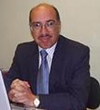
Fabio began his professional engineering career 43 years ago at Tecnaire Ltd. -HVAC Engineering and Contracting Company located in Bogota, Colombia, South America- initially as Junior Engineer and fulfilling over time challenging positions as Regional Manager, Technical VP and lately President/Owner since 1991. He obtained his bachelor’s degree in Industrial Engineering from Universidad Javeriana (1978) and followed complementary professional studies and advanced engineering programs on: Business Top Executive Management Program (1990), Dehumidification Systems Applications and Control (1994), Air Conditioning Projects (2006), as well as Rational Energy Use and Energy Efficiency (2004, 2011). He is a registered Professional Engineer in Colombia.
Following his active participation in the Design & Contracting side of HVAC engineering for more than 35 years in diverse projects including Industrial, Commercial, Applied and Corporate applications, he has dedicated last years to concentrate his experience in the HVAC Consultancy activity, as well as Energy Assessments and Audits.
Fabio has attended several National and International Engineering Seminars, Congresses, and Conferences visiting five (5) Continents as a Distinguished Lecturer. He has been guest professor at various Colombian Universities and is Director of ACAIRE´s HVAC Advanced Engineering Program in Bogota (since 2015).
He was leading co-founder and President of several organizations including ACAIRE -Colombian HVAC+R Association, ASHRAE Colombia Chapter, AEE Colombia Chapter and CIC-LAC – Consultant Engineers Council for Latin America and Caribbean.
Mr. Clavijo is ASHRAE member since 1983 and has been recipient of multiple awards and recognitions from National and International organizations including ASHRAE Distinguished Service (2015, Life Member (2017) and Fellow (2019). Also, ACAIRE Honorary Member (2014) and Distinguished Industrial Engineer by Universidad Javeriana, Bogota (2010).
He led as ACAIRE Editing Director of the book “Air Conditioning and Refrigeration in Colombia” (2006). Also served as Research Project Director and Book author of “Chilled Water Systems - Energy Efficiency and Environmental Guide” (2013) and “Climate Design Conditions for HVAC+R projects for 16 Colombian cities” (2016). He is author of various technical articles published in several national and international engineering magazines and journals.
Several Research projects and an International Technology Mission led by Fabio have been accomplished and recognized over the years, thru integration of joint efforts with Government agencies, Private sector, and several Universities in Colombia.
This presentation will guide attendants thru an extended understanding of the psychometric chart and those detailed humidity variables that are critical in humidity issues. The session will follow thru a deeper exploration of moisture concepts, loads and the resulting humidity impact on buildings, operational costs and comfort complains.
The evaluation of alternative solutions will lead to review building construction issues, HVAC equipment selection and associated ways to integrate temperature and humidity control along with building operation. Finally, a brief presentation of dehumidification technologies will close the session.
An analysis of psychrometric processes in medium and low humidity applications will guide attendants thru the moisture psychrometric and engineering analysis, as well as, equipment selection and control strategies. A detailed study of humidity sources and the associated effects will enhance opportunities to improve building construction, design and specifications in low and medium humidity applications.
Configuration of various system arrangements and technologies will extend the presentation to show energy and humidity control performance.
A brief review of air filtration technology followed by an analysis of microorganisms´ behavior and replication activity in buildings and A/C systems will follow the understanding of how microorganisms affects human health in buildings, creating IAQ problems.
Introduction of UVC history and recent technology developments will guide attendants towards a deeper understanding of ways to solve previous IAQ issues thru a further review of air handling systems selection, operation and maintenance, resulting in higher overall improved operation costs, as well as, building energy efficiency and performance.
Last months since 2020 have accelerated the research activity within ASHRAE among many other technology conglomerates to understand initially the way COVID-19 made an impact on people´s health thru the various contamination routes.
Industry leaders and researchers have moved towards solutions to limit risks thru their many routes of daily activity while keeping viable HVAC standing systems under best possible adaptation possibilities.
The session will review microorganisms’ structure and replication viability, followed by accepted proved HVAC strategies and technologies that support improved Indoor Air Quality and safe health environments.
A presentation of ASHRAE position on Airborne Diseases will characterize technical solutions that promote safer environments within enclosed spaces.